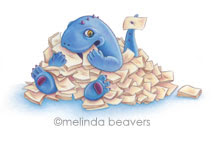Is a submission labeled as a "picture book" or "picture story book" that comes in at 2,000+ words dead on arrival? How important is this categorization? I feel like the word count is justified, and still leaves creative space for illustrations. I just want to make sure it gets a fair read. If it wasn't good enough, writing-wise, I could deal with that.
Know where I hear the term "picture story book" all the time? Authors.
Know where I don't? Publishers.
"Picture story book", in authors' minds at least, indicates a longer illustrated text. How much longer seems to vary per source, so it's very vague as publishing terms go. It's also kind of meaningless: do shorter picture books not have stories? Why couldn't you call
Tuesday a picture story book, since the story is told
in pictures? Is
Cloudy with a Chance of Meatballs (890 words) a picture story book? Is
Ivanhoe (6,022 words)?
After countless conferences, critiques, and pitch sessions, the impression
I've developed (without making any assumptions about
your work) is that "picture book" is a
format, and "picture story book" is an
excuse for not caring who's going to buy your book.
No matter what kind of book you're writing, you should always be thinking about your audience and your competition.
1. AudienceLet's just say for the purposes of this discussion (and leaving aside my own personal antipathy for the term) that by "picture story book" we mean a text in which not all of the plot points can be illustrated.
That means to me that this is a question of how old your audience is and thus how much patience and reading skill the audience brings to the reading.
The children who need a fairly high illustration-to-plot ratio are either (a) impatient listeners / pre-readers or (b) low-to-moderate fluency readers.
The children who
don't need a fairly high illustration-to-plot ratio are either (c) listeners / pre-readers who have had a high exposure to read-alouds and have developed the patience and attention span for them or (d) high fluency (independent) readers.
Now here's the rub: there are fewer children in category (c) these days than there used to be, and the kids in category (d) tend to feel picture book formats are "for babies". So while I wouldn't say that longer-text picture books are "dead on arrival", they have to be extremely well targeted and thoughtfully written.
2. CompetitionWhich books
published in the last five years have a format, word count, audience age, and author recognition level* like your book?
If you can find some published at reputable houses, great!
If you can't,
that should mean something to you.
*Never use books by celebrities as competition! Never!___________________________________________
Am I right to suspect that writers with no publishing credits have a very, very small chance of landing an agent?
Yes.
Thus it would be smarter to submit to editors/presses first?
No. The chances of landing a publisher from the slush pile are just as low.
If a contract were offered from a publisher, is there sufficient time to query and attract an agent?
If by "sufficient time" you mean a week, then yes. I would expect a response from any author I'd made an offer to in that time.



